| BLACK SOCIAL HISTORY African American Athletes |
|
|
Eighteen Black athletes represented the United States in the 1936 Olympics. African-Americans dominated the popular track and field events. Many American journalists hailed the victories of Jesse Owens and other Blacks as a blow to the Nazi myth of Aryan supremacy.
Goebbels's press censorship prevented German reporters from expressing their prejudices freely, but one leading Nazi newspaper demeaned the Black athletes by referring to them as "auxiliaries." The continuing social and economic discrimination the Black medalists faced upon returning home underscored the irony of their victory in racist Germany. |
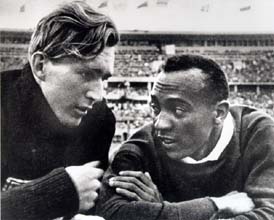
 The American press reported widely on the friendship that developed between Owens and his German competitor in the long jump, Carl Ludwig (“Luz”) Long. Long was killed in action during World War II.
—USHMM #69562/Courtesy of Dr. George Eisen
|
|
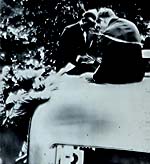
 The son of Alabama sharecroppers, Owens was besieged by autograph seekers throughout his stay in Germany. He was cheered loudly every time he entered the stadium by the mostly German audience. July 31, 1936.
—USHMM #21726/UPI/Bettmann/CORBIS
|
|
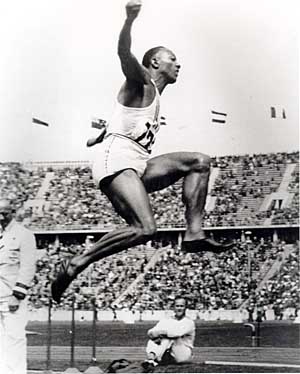
 Jesse Owens, “the fastest human being,” captured four gold medals and became the hero of the Olympics. In the long jump he leaped 26 feet 5-1/2 inches, an Olympic record. Immediately after the Games, Owens hoped to capitalize on his fame and quit the AAU's European tour of post-Olympic meets; for this action, the AAU suspended him from amateur competition. August 4, 1936.
—USHMM #14519/Bundesarchiv Koblenz, Germany (inventory number 146-1995-066-31A)
|
|
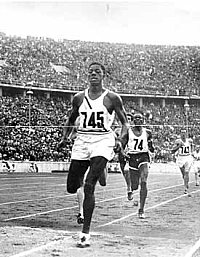
 John Woodruff won the 800-meter run, finishing in 1:52.9 minutes. Woodruff served as an officer in a racially segregated American Army unit during World War II.
—USHMM #14498/FPG International, New York
|
|
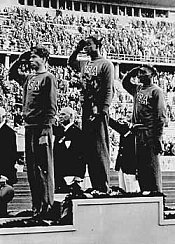
 The United States high jump team swept their event at the Olympics. From left to right: Delos Thurber (bronze), Cornelius Johnson (gold), and David Albritton (silver). Johnson cleared the bar at 6 feet, 8 inches, an Olympic record. August 2, 1936.
—USHMM #21699/UPI/Bettmann/CORBIS
|
|

 “Mack” Robinson took the silver in the 200-meter dash. His younger brother, Jackie, would become the first African-American player in major league baseball in 1947.
—USHMM #21719/Courtesy of Mack and Delano Robinson
|
|

 Archie Williams, from the University of California, Berkeley, won the 400-meter race with a mark of 46.5 seconds. During World War II, he served as an instructor for African-American fighter pilots at the segregated army airfield in Tuskegee, Alabama
—USHMM #14503/Bundesarchiv Koblenz, Germany (inventory number 146-1995-066-19A)
|
|

 The American press reported widely on the friendship that developed between Owens and his German competitor in the long jump, Carl Ludwig (“Luz”) Long. Long was killed in action during World War II.
The American press reported widely on the friendship that developed between Owens and his German competitor in the long jump, Carl Ludwig (“Luz”) Long. Long was killed in action during World War II.



























































































No comments:
Post a Comment